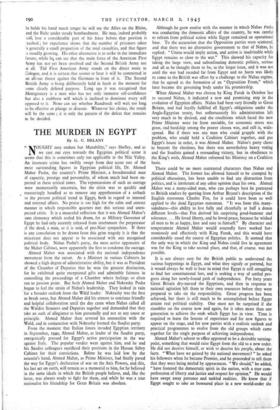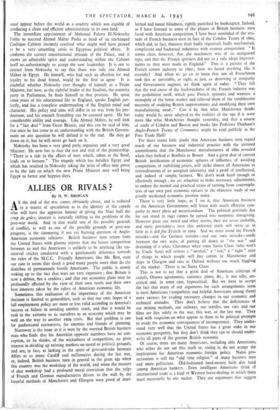THE MURDER IN EGYPT
By G. C. DELANY " NOUGHT may endure but Mutability,' says Shelley, and as we cast our eyes towards the Egyptian political scene it seems that this is sometimes only too apPlicable to the Nile Valley. An insensate crime has swiftly swept from that scene one of the most outstanding. figures in Egyptian political life, Dr. Ahmed Maher Pasha, the country's Prime Minister, a broadminded man of capacity, prestige and personality, of whom much had been ex- pected in these critical times. The repercussions of such an outrage were momentarily uncertain, but the Crisis was so quickly and reassuringly handled as to remove any apprehension of a setback to the present political trend in Egypt, both in regard to internal and external affairs. No praise is too high for the calm and correct manner in which responsible quarters met this serious and unex- pected crisis. It is a mournful reflection that it was Ahmed Maher's awn clemency which sealed his doom, for as Military Governor of Egypt he had only recently released from internment the perpetrator af the deed, a man, so it is said, of pro-Nazi sympathies. If there is any consolation to be drawn from this grim tragedy it is that the miscreant does not appear to be associated with any recognised political body. Nahas Pasha's party, the most active opponents of the Maher Cabinet, were apparently the first to condemn the outrage.
Ahmed Maher was associated with the national independence movement from the outset. As a Minister in various Cabinets he showed a high degree of administrative ability, but it was as President of the Chamber of Deputies that he won the greatest distinction, for he exhibited quite exceptional gifts and admirable fairness in controlling the proceedings of a Chamber where feelings so often ran to passion point. But both Ahmed Maher and Nokrashy Pasha began to feel the strain of Nahas's leadership. They looked in vain for a broader outlook from the Wafd leader. Nokrashy was the first to break away, but Ahmed Maher did his utmost to continue friendly and helpful collaboration until the day came when Nahas called all the Wafdist Senators and Deputies together and demanded that they take an oath of allegiance to him personally and not to any cause or principle. Ahmed Maher then severed his connection with the Wafd, and in conjunction with Nokrashy formed the Saadist party.
From the moment that Italian forces invaded Egyptian territory in September, 1940, Ahmed Maher, as leader of the Saadist party, energetically pressed for Egypt's active participation in the war against Italy. The popular verdict went against him, and he and his Saadist colleagues sacrificed their positions in the Hassan Sabry Cabinet for their convictions. Before he was laid low by the assassin's hand, Ahmed Maher, as Prime Minister, had finally paved the way for Egypt's declaration of war on the Axis Powers, and.this, his last act on earth, will remain as a memorial to him, for he believed in the same ideals in which the British people believe, and, like the latter, was always ready to fight for them, and while he was a true nationalist his friendship for Great Britain was absolute. • Although he grew restive with the manner in which Nahas Pasha was conducting the domestic affairs of the country, he was careful to refrain from political action while Egypt remained an operational base. To the accusation that the Opposition parties were scattered, and that there was no alternative government to that of Nahas, he replied: "Union would imply action, and action is inadvisable while Egypt remains so close to the war." This showed his capacity for taking the large view, and subordinating domestic politics, serious and all as he thought them to be, to the larger issue, and it was not until the war had receded far from Egypt and no harm was likely to come to the British war effort by a challenge to the Nahas regime, that he agreed to the formation of an "Opposition Front," which later became the governing body under his premiership.
- When Ahmed Maher was chosen by King Faruk in October last to succeed Nahas, it indicated a new and promising step in the evolution of Egyptian affairs. Nahas had been very friendly to Great Britain, and had loyally fulfilled all Egypt's obligations under the Anglo-Egyptian treaty, but unfortunately his administration left very much to be desired, and the conditions which faced the new Prime Minister were far from enviable, for economic stress was great, and hardship among the poorer classes was, and still is, wide- spread. But if there was any man who could grapple with the problem, who could hold a Coalition Cabinet together, and put Egypt's house in order, it was Ahmed Maher. Nahas's party chose to boycott the elections, but there was nevertheless heavy voting and the Saadists gained a resounding victory, but in obedience to the King's wish, Ahmed Maher reformed his Ministry on a Coalition basis.
There could be no more contrasted characters than Nahas and Ahmed Maher. The former has allowed himself to be cramped by political obsessions, has been unable to find any distraction from politics, and is intolerant of any other opinion than his own. Ahmed Maher was a many-sided man, who can perhaps best be portrayed to British readers by quoting from Arthur Bryanes description of the English statesman Charles Fox, for it could have been so well applied to the dead Egyptian statesman. "It was from this many- sidedness—this ability to live fully and cheerfully at half a dozen different levels—that Fox derived his surprising good-humour and tolerance. ... He loved liberty, and he loved peace, because he wished all men to be as happy, free and easy as himself." By character and temperament Ahmed Maher would assuredly have worked har- moniously and effectively with King Faruk, and this would have considerably eased the course of Egyptian politics. It seemed that the only way in which the King and Nahas could live in agreement was for the King to take second place, and that, of course. was not possible.
It is not always easy for the British public to understand the various happenings in Egypt, and what they signify or portend, but it would always be well to bear in mind that Egypt is still struggling to find her constitutional feet, and is seeking a way of settled pro- gress along her newly-found path of independence. For forty years Great Britain dry-nursed the Egyptians, and then in response to national agitation left them to 'their own resources before they were prepared to take Oh the responsibility. Great progress has been achieved, but there is still much to be accomplished before Egypt attains real political stability. One must not be surprised if she stumbles on the course now and again, for it takes, more than one generation to achieve the ends which Egypt has in view. Time is required to learn the lessons of experience and for new figures to appear on the stage, and for new parties with a realistic outlook and practical programmes to evolve from the old groups which came together for the single purpose of achieving independence.
Ahmed Maher's advent to office appeared to be a desirable turning- point, something that would raise Egypt from the old to a new order. He did not deceive himself, or wish to deceive his people, about the facts. "What have we gained by the national movement? " he asked his followers when he became Premier, and he proceeded to tell them that they were being misled by appearances. "We should," he added, "have fostered the democratic spirit in the nation, with a true com- prehension of liberty and justice and respect for opinion." He would have swept away pretence and tackled realities. He knew that if Egypt sought to take an honoured place in a new .world-order she
must appear before the world as a country which was capable of producing a clean and efficient administration in its own land.
The immediate appointment of Mahrnud Fahmy El-Nokrashy Pasha to succeed Ahmed Maher Pasha as head of an unchanged Coalition Cabinet instantly resolved what might well have proved to be a very unsettling crisis in Egyptian political affairs. It confirms the correct constitutional attitude of the Palace, and it shows an admirable spirit and understanding within the Cabinet itself so.unhesitatingly to accept the new leadership. It is not to detract from Nokrashy to say that there was only one Ahmed Maher in Egypt. He himself, who had such an affection for and loyalty to his dead friend, would be the first to agree It is doubtful whether Nokrashy ever thought of himself as a Prime Minister, but now, as the rightful leader of the Saadists, the majority party in Parliament, he finds himself in that position. He spent some years of his educational life in England, speaks English per- fectly, and has a complete understanding of the English mind and character. His policy and aims will differ in no way from his pre- decessor, and his staunch friendship can be counted upon. He has considerable ability and courage. Like Ahmed Maher, he will look for a "fair deal" from Great Britain, and this can be said of him, that once he has come to an understanding with the British Govern- ment on any question he will defend it to the end. He may go down on it, but he will never go back on it.
Nokrashy has been a very good party organiser and a very good Minister. He now has to face the test and trial of the premiership. "There is a tide in the affairs of men which, taken at the flood, leads on to fortune." The tragedy which has befallen Egypt and which has resulted in Nokrashy taking the reins of office may prove to be the tide on which the new Prime Minister may well bring Egypt to better and happier days.



























 Previous page
Previous page